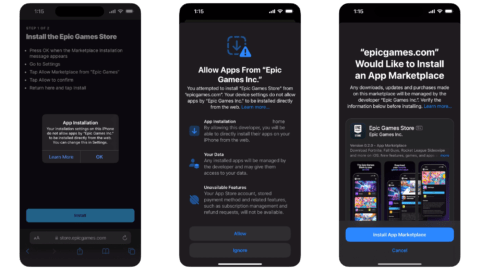Epic Games and its CEO, Tim Sweeney, have been at war with Apple for years now. The present situation is this: Epic only wants to put Fortnite on iPhones and iPads if it can use its own store and payment processor instead of the official Apple App Store, which takes a 30% cut of revenue. Apple, meanwhile, would prefer it if Epic did not do that.
Epic didn't get the ruling it wanted when it sued Apple over this issue in the US, but the story is different in Europe. The European Union's 2022 Digital Markets Act now requires Apple to allow third-party marketplaces on iOS devices, which means that Epic can finally sell Fortnite V-bucks in Europe without paying Apple a cut for the privilege of accessing one of the world's largest mobile device markets (except in the form of a brand new fee Apple has devised in response to the law, which Epic also takes issue with).
The time has finally come for the two companies to put the law into practice: Epic has announced that the Epic Games Store is launching on iOS today in Europe, and worldwide on Android. For now, it'll house just three games: Fall Guys, Rocket League Sideswipe, and Fortnite, the latter of which has notably been unavailable to download on iOS since Epic intentionally broke Apple's TOS in 2020 in an act of corporate protest.
The catch is that Apple has not made it especially easy to install the new Epic Games Store iOS app. On a call with press earlier this week, Sweeney accused Apple of “malicious compliance,” saying that the company has technically done what's required by the EU, but has been “terribly obstructive” to Epic and other companies along the way (at one point, Apple revoked Epic's developer account).
One way Apple has been obstructive, says Epic, is by designing an off-putting 15-step install process for third-party marketplaces.
Some of the installation steps are normal, such as clicking an “install” button on the Epic Games website, and Epic stretches the definition of “installation step” by counting both returning to the main iOS screen after installation and opening the newly-installed app. But the process does look long, and throws up what Epic refers to as “scare screens,” prompts telling users they need to change their iOS settings to allow external marketplaces (implying risk), and “dead ends,” which are steps that don't automatically return the user to the install process.
“For now, the process of installing the Epic Games Store on iOS and Android is lengthy due to Apple and Google introducing intentionally poor-quality install experiences laden by multiple steps, confusing device settings, and scare screens,” Epic said today. “We are continuing to fight in courts and work with regulators around the globe to eliminate the anticompetitive terms that Apple and Google impose on developers and consumers, so we can build a better store for everyone.”

Epic expects this complicated install process to deter many from installing the Epic Games Store on iOS, but believes motivated European Fortnite fans will make the effort to finally play Fortnite on iPhones and iPads again. Epic hopes those players will lead the way in building an install base before it starts adding third-party games to the mobile Epic Games Store.
Sweeney's vision for a giant game store, launcher, and multiplayer platform that is totally independent from the hardware and software platforms it runs on—what he used to call the “metaverse,” but the term's started to go out of fashion—is one step closer to reality. He expects to launch the Epic Games Store on iOS in Japan soon, too, once new regulations take effect.
In the United States, however, no progress has been made since Epic and Apple's big trial.
“It's been a massive failure of the United States regulatory and political system that there is not a crisp, clean action to stop the monopolization occurring in the United States and in the whole world by a US company,” said Sweeney on this week's call. “That's been disheartening to see, but hopefully over the coming years, somebody will continue to take that on.
“In the meantime, we foresee being locked out of the iOS App Store worldwide, with the exception of these territories, for the foreseeable future, for perhaps years more, as we continue to fight worldwide.”
Epic is also launching Fortnite, Rocket League Sideswipe, and Fall Guys on AltStore, another new third-party iOS marketplace which is taking advantage of the Digital Markets Act in Europe.






